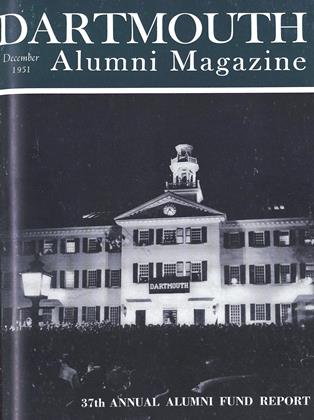In the annual financial report for 1950- 51, which is briefly summarized in this issue, Treasurer John F. Meek '33 points out that on the expense side the greatest increase percentage-wise occurred in scholarship aid—a jump of 17% over the year before, as compared with a 5.2% increase in total educational and general costs. The 1950-51 scholarship figure of 1274,925 was $40,871 higher than for 1949-50, reflecting both the drop in the number of veterans receiving G.I. aid (only 6% of the student body) and the determination of the College to do everything possible to lift its financial aid program to the level necessary to preserve the democratic character of the student body.
For the current college year, financial aid will continue its upward trend. In all its forms, including loans and Dartmouth Dining Association employment as well as scholarship grants, it will reach the record total of $422,000, according to Prof. Francis J. Neef, chairman of the committee on scholarships and loans. Of this total approximately $375,000 is in cash grants, both scholarships and loans, and the additional §47,000 will be earned by students working for the D.D.A.
The total of §422,000 in aid is being received by 498 students, or an average of $847 per man. In the present freshman class, 145 men have been granted scholarships totaling .$110,000, and an additional $14,000 is being earned by those who have D.D.A. jobs. This averages out to $855 for each of the freshmen on aid, a figure that is more than double the amount granted to entering students ten years ago. Scholarships awarded to the freshmen range from 1175 to $1575, while grants to upperclassmen range up to $1275.
Among the men receiving aid this year are 22 foreign students, including six dis- placed persons who are sponsored by the Undergraduate Council. Freshman schol- arship holders are from Formosa, Ger- many and Nigeria as well as from 26 states in this country.
Last year only a little more than half of the cost of scholarship aid was covered by income from specific endowment funds. The rest of the money used to help deserv- ing men had to come from the College's general funds. One of the top aims of the Dartmouth Development Council is to build up resources, both endowment funds and current gifts, that will enable Dart- mouth to broaden the base of its scholar- ship program and at the same time to make larger awards in certain especially needy cases. In connection with the latter objective, the portion of. the 1951 Alumni Fund set aside as a Scholarship Reserve will do an invaluable job for the College. This reserve fund of $75,000 will be used, beginning with next fall's entering class, to increase individual grants to unusually outstanding applicants. Next to keeping Dartmouth's educational operations in the black, there is probably no other use of Alumni Fund money that would appeal to the average alumnus more than helping to bring to Hanover really top-notch boys who would otherwise miss out on a Dart- mouth education.
 View Full Issue
View Full Issue
More From This Issue
-
 Class Notes
Class Notes1917
December 1951 By KARL W. KOENIGER, DONALD BROOKS -
 Article
ArticleThe 1951 Alumni Fund
December 1951 By CHARLES J. ZIMMERMAN '23 -
 Class Notes
Class Notes1929
December 1951 By F. WILLIAM ANDRES, EDWIN C. CHINLUND, JACK D. GUNTHER -
 Class Notes
Class Notes1950
December 1951 By ENS. SCOTT C. OLIN, SIMON J. MORAND III -
 Class Notes
Class Notes1935
December 1951 By HENRY R. BANKART JR., JOHN WALLACE, SIDNEY A. DIAMOND -
 Class Notes
Class Notes1946
December 1951 By REGINALD F. PIERCE JR., ROBERT Y. KIMBALL














